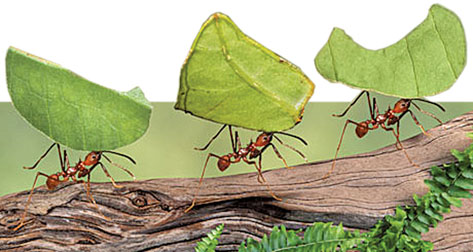Making use of pensioners, ants do that
It was not yesterday that we got to know we could learn many lessons
from Ants. We learnt that Ants and Bees work very hard and do not even
know the meaning of being 'lazy'.
Now there is another new lesson to be learnt from the ants. That is
respecting the elderly and not discarding them like 'unwanted members of
society'. Unbelievable, isn't it? but it is true according to many
researches.
A study of Central American leaf-cutter ants has shown that a key
secret to the success of ants is the insect's ability to identify the
importance of age in the work place. Researchers of University of Oregon
and the Oregon State University, supported by previous research have
found that the younger and more vigorous members of the colony are given
the toughest job of cutting through the leaves they harvest.
Their sharp young teeth do this job efficiently, but as they get
older their teeth become relatively worn and blunt, just like humans.
But the older ants are then given a new role that suit their physical
abilities. They then become carriers.
 |
|
Uncles go firstí, ants know that older
members can still make a worthwhile contribution to the
colony |
Instead of cutting, they transport the leaves back to the colony
where they are harvested for food. Like some humans, these insects
recognize that older members of the group can still make a worthwhile
contribution to society.
Dr Robert Schofield, who led the team of US scientists, says 'Much of
the cutting is done with a V-shaped blade between teeth on their
mandibles. This blade starts out as sharp as the sharpest razor blade
that humans have developed.'
But over time the teeth become blunt and the cutting job slows down.
Their hi-tech microscopes compared the pristine teeth of
laboratory-reared pupae with the worn teeth of the wild forager ants.
They have found that the blade of a cutter ant to be 340 times duller
than the pristine blade of a pupae. Their study is reported in the
journal 'Behaviour Ecology and Sociobiology' and revealed ants with the
most worn teeth, which had less than 10% of the cutting blade,
exclusively carried leaves rather than cut them. 'This study
demonstrates an advantage of social living that we are familiar with,'
said Dr Schofield. 'Humans that can no longer do certain tasks can still
make very worthwhile contributions to society.'
Leaf-cutter ants live in colonies that have a very developed
structure with a strict hierarchy. Commonly known under the name of
'Leaf-cutter ants' any of their 41 species are endemic to south and
Central America and some parts of southern United States.Next to humans,
leafcutter ants form the largest and most complex animal societies on
Earth. In a few years, the central mound of their underground nests can
grow to more than 30 meters. In a mature leafcutter colony, ants are
divided into castes, based mostly on size, that perform different
functions and they are called minims, minors, mediae and majors. Minims
are the smallest workers, and tend to the growing brood or care for the
fungus gardens. Minors are slightly larger workers and are present in
large numbers in and around foraging columns. These ants are the first
line of defense and continuously patrol the surrounding terrain and
attack any enemies that threaten the foraging lines. Mediae are the
generalized foragers, who cut leaves and bring the leaf fragments back
to the nest. Majors are the largest and act as soldiers, defending the
nest from intruders, although there is recent evidence that majors
participate in other activities, such as clearing the main foraging
trails of large debris and carrying bulky items back to the nest.
Just when we thought we have learnt everything about life from
animals like ants, we have far more to discover. Next time, more
governments also might think of using its pensioners.
|

